Why You Shouldn’t Toss Old Batteries In The Bin
For many of us, the rubbish bin is where anything that we no longer need should go. While the main idea might be to keep your environment clean, some items do not belong to the household bin either. Used batteries are an excellent example of things that shouldn’t be tossed into the rubbish bin. One of the reasons for this is that most batteries contain heavy compounds and metals that may be harmful to you and the environment in general. This article will help you understand this and more about your batteries and how to dispose of them safely.

Why Used Batteries Don’t Belong In The Rubbish Bin?
As mentioned earlier, most batteries contain heavy metals that can be harmful to the environment. Most of these batteries (rechargeable and one-time use) contain copper, mercury, lead, zinc, cadmium, lithium, potassium, and manganese, to name but a few. These metals are hazardous to animals and the environment and can easily pollute ground soil and water bodies around landfills. In other words, these toxic chemicals could make their way back to our water supplies if we aren’t careful with them. See here UPS battery replacement.
Safe And Recommended Ways To Dispose of Batteries
Following the recommended battery disposal methods can help protect the environment from toxic waste. Here are some of the recommended ways to do so.
- Battery Banks
Most local governments have provided battery banks at leisure centers and supermarkets, among other local institutions, for residents to drop off their used batteries. All you need to do is collect all batteries at home that require disposing of, then bring them with you when you visit these institutions. The local authorities will then collect these batteries for safe disposal and recycling.
- Ask For A Recycling Bag
With the different types of batteries in use today, determining the right way to dispose of each can be quite a challenge for most consumers. Your TV remote batteries, for example, should be disposed of differently from how you‘d handle dead laptop or digital camera batteries. Improperly disposing of these off can not only be hazardous to the environment and you, but illegal in some areas. Outlined below are a few tips and the correct way to handle the different types of batteries used in our households today.
Disposing Household Batteries
- Single-Use Batteries
The batteries are commonly used for lightweight applications such as in remotes, children’s toys, small electronics, and flashlights. These batteries are non-rechargeable and come in different capacities and sizes, such as AAA, AA, D-cell, 9V, etc.
Today, most single-use batteries can be disposed of in the regular trash can, well, except in California. In California, throwing any type of battery in your rubbish bin is punishable by law. Single-use batteries today are made of non-toxic materials, hence can be disposed of as regular trash. Manufacturers today no longer use mercury in their batteries, except button cell batteries. Button cell batteries should be treated and handled like rechargeable, hence shouldn’t be tossed off as regular waste.
Are Single-Use Batteries Recyclable?
Unknown to many, most single-use batteries can be recycled. Manufacturers can use a part, if not all, of the battery to make new batteries or other products. Recycling these batteries, however, attracts a recycling fee.
These are but some of the recommended and safest ways to handle household batteries. Many of these batteries also have a guideline on how to dispose of them properly printed on the packaging. You can also inquire with the manufacturer to know how best you can dispose of their batteries. You can also read more on handling and disposing of dead rechargeable batteries.



